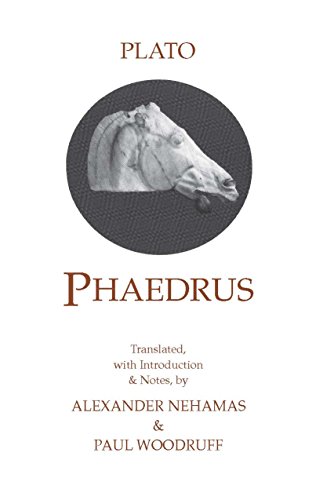The Hackett Classics edition of Phaedrus
The Phaedrus is a philosophical dialogue written by Plato, in which the characters Socrates and Phaedrus engage in a discussion about the nature of love, rhetoric, and the nature of the soul. It is one of Plato’s most famous works and explores the themes of truth, beauty, and the power of words. The dialogue is set outside the city walls of Athens, in a peaceful country landscape, where Socrates and Phaedrus engage in a deep and profound conversation that delves into the complexities of human nature and knowledge. Through their dialogue, Plato presents a complex and nuanced exploration of the human soul and the power of language and persuasion.


Phaedrus Plot Summary
Phaedrus is a philosophical dialogue written by the ancient Greek philosopher Plato. The dialogue takes place between Socrates and Phaedrus, a young Athenian aristocrat, as they discuss the nature of love and the art of rhetoric. The dialogue covers several key themes, including the nature of love, the dangers of excessive pride, and the importance of self-knowledge.
The dialogue begins with Phaedrus sharing a speech he has heard from Lysias, a prominent Athenian politician and rhetorician, on the nature of love. Lysias argues that love based on self-interest is preferable to love that is driven by passion. Phaedrus is impressed by the speech and asks Socrates for his opinion.
Socrates initially critiques Lysias’ argument, pointing out that love based on self-interest is not true love but rather a form of manipulation. Socrates then presents his own speech on the nature of love, in which he argues that love is a form of divine madness that can inspire humans to achieve great things. He also warns of the dangers of excessive pride and the importance of self-knowledge.
As the dialogue progresses, Socrates and Phaedrus discuss the nature of rhetoric and its role in society. Socrates argues that true rhetoric should be based on knowledge and truth, rather than manipulation and deception. He also emphasizes the importance of self-examination and self-awareness in order to avoid falling victim to pride and hubris.
Throughout the dialogue, Socrates uses a series of myths and allegories to illustrate his points about love, rhetoric, and self-knowledge. One of the most famous myths in the dialogue is the myth of the charioteer, which tells the story of a soul divided into three parts: a rational part, a spirited part, and a desirous part. The charioteer must navigate these parts of the soul in order to achieve harmony and self-control.
As the dialogue draws to a close, Socrates and Phaedrus discuss the nature of writing and the role of the written word in preserving knowledge and wisdom. Socrates argues that the written word can be a valuable tool for disseminating knowledge, but it can also be dangerous if used improperly. He emphasizes the importance of critical thinking and self-examination in order to discern truth from falsehood.
In conclusion, Phaedrus is a profound philosophical dialogue that explores the nature of love, rhetoric, and self-knowledge. Through the conversations between Socrates and Phaedrus, Plato presents a powerful critique of the dangers of pride and hubris, as well as a celebration of the transformative power of love and wisdom. The dialogue serves as a timeless reminder of the importance of self-awareness and critical thinking in order to navigate the complexities of human life.
Phaedrus Key Takeaway
One of the key takeaways from the book “Phaedrus” by Plato is the importance of the philosophical pursuit of truth and knowledge. The dialogue between Socrates and Phaedrus delves into the nature of love and rhetoric, with Socrates arguing that true knowledge comes from within and must be sought through dialectical reasoning rather than mere persuasion.
Another key takeaway from “Phaedrus” is the danger of relying on superficial or manipulative forms of communication, such as rhetoric, to deceive or influence others. Socrates warns against the dangers of using rhetoric to win arguments or persuade others without a genuine commitment to seeking truth and understanding.
Overall, “Phaedrus” emphasizes the importance of critical thinking, self-examination, and honest dialogue in the pursuit of knowledge and wisdom. It serves as a reminder to readers to question their own beliefs and assumptions, engage in meaningful discussions with others, and strive for deeper understanding of the world around them.
Conclusion
In the conclusion of the Phaedrus book, Socrates and Phaedrus have a deep discussion about the nature of love and knowledge. Socrates argues that the pursuit of wisdom and truth is the highest form of love, and that a true philosopher must constantly strive towards this ultimate goal. The dialogue ends with Socrates urging Phaedrus to embrace the pursuit of knowledge and to always seek out the truth, even if it means challenging his own beliefs.
Overall, Phaedrus is a thought-provoking and philosophical dialogue that explores themes such as love, knowledge, and the nature of rhetoric. It challenges readers to think deeply about the nature of truth and wisdom, and to consider the importance of pursuing knowledge for its own sake.
Readers who enjoy philosophical works and engaging in deep, introspective discussions will likely appreciate Phaedrus. Those interested in exploring the ideas of ancient Greek philosophy and the Socratic method will find this dialogue particularly engaging.
In conclusion, Phaedrus is a timeless work that offers valuable insights into the nature of love, knowledge, and truth. It is a thought-provoking read that will leave readers pondering the significance of wisdom and the pursuit of truth in their own lives.

No responses yet